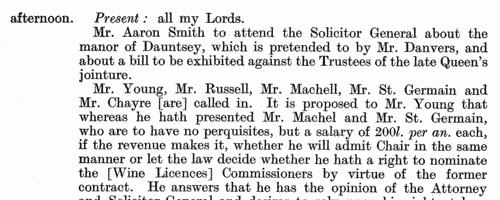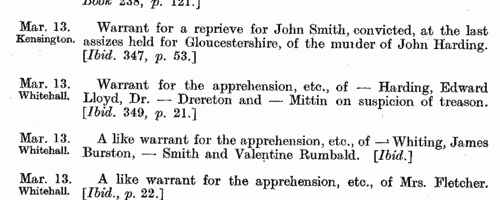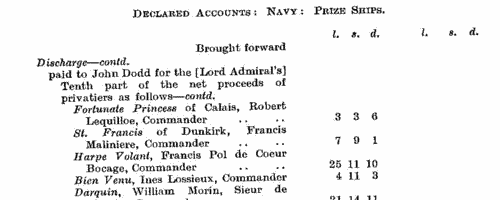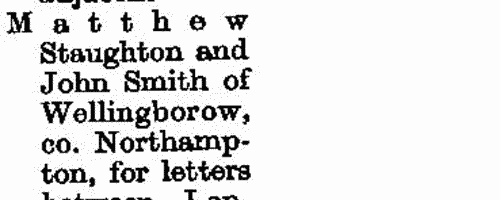Our indexes include entries for the spelling grand. In the period you have requested, we have the following 121 records (displaying 1 to 10):
Curia Regis Rolls
(1210-1212)
The Curia Regis, king's court, of mediaeval England took cases from throughout the country, and its records are among the most important surviving from this early period. | Sample scan, click to enlarge

|
Liberate Rolls
(1240-1245)
These chancery liberate rolls of the 25th to 29th years of the reign of Henry III of England record the details of payments and allowances as part of the administration of government. Most entries start with the Latin words 'liberate', meaning 'deliver', or 'allocate', meaning allow. There are also 'contrabreves', warrants mainly to sheriffs of shires, assigning them tasks and allowing expenses. Most of the entries relate to England and Wales, but there are occasional references to Ireland and the English possessions in France. | Sample scan, click to enlarge

|
Official Papers
(1625-1626)
The State Papers Domestic cover all manner of business relating to Britain, Ireland and the colonies, conducted in the office of the Secretary of State as well as other miscellaneous records.
| Sample scan, click to enlarge

|
Treasury Books
(1689-1692)
Records of the Treasury administration in Britain, America and the colonies.
| Sample scan, click to enlarge

|
Official Papers
(1697)
The State Papers Domestic cover all manner of business relating to Britain, Ireland and the colonies, conducted in the office of the Secretary of State as well as other miscellaneous records. Includes lists of passes to travel abroad.
| Sample scan, click to enlarge

|
Treasury and Customs Officials, Civil Servants, Military Officers and Pensioners
(1706-1707)
Government accounts, with details of income and expenditure in Britain, America and the colonies, October 1706 to December 1707: an abstract prepared by William A. Shaw, and issued in 1952 by authority of the Lords Commissioners of the Treasury, but not hitherto indexed. These are the main Revenue and Expenditure Accounts, together with the audited Declared Accounts for each main department: Guards and Garrisons; the Army in the Low Countries; the Army in Spain and Portugal; purchase of horses for remounting the Forces sent to Portugal, and subsidy paid to the King of Portugal; Marines; Transport; Remittances to Flanders; Chelsea Hospital; Navy Treasurer; Commission for Sick and Wounded Seamen and Exchange of Prisoners-of-War; Prize Ships; Admiralty Droits; Salvage Money; Ordnance; Cofferer of the Household; Treasurer of the Chamber; Her Majesty's Works and Buildings; Queen Anne's Private Pensions; Treasury Solicitor; the Tin Affair in Cornwall and Devon; Customs; Tobacco; Silks and Linens; Excise; Salt Duty; Malt Duty; the Mint; Wine Licences; General Letter Office and Penny Post Office; Stamped Vellum, Parchment and Paper; Hackney Coach Licences; Hawkers and Pedlars; Hanaper; First Fruits and Tenths.
| Sample scan, click to enlarge

|
Treasury and Customs Officials, Officers and Pensioners
(1711)
Government accounts, with details of income and expenditure in Britain, America and the colonies
| Sample scan, click to enlarge

|
 Masters and Apprentices
(1714) Masters and Apprentices
(1714)
Apprenticeship indentures and clerks' articles were subject to a 6d or 12d per pound stamp duty: the registers of the payments usually give the master's trade, address, and occupation, and the apprentice's father's name and address, as well as details of the date and length of the apprenticeship. 1 January to 10 April 1714. | Sample scan, click to enlarge

|
 Masters and Apprentices
(1716) Masters and Apprentices
(1716)
Apprenticeship indentures and clerks' articles were subject to a 6d or 12d per pound stamp duty: the registers of the payments usually give the master's trade, address, and occupation, and the apprentice's father's name and address, as well as details of the date and length of the apprenticeship. 3 August to 31 December 1716. | Sample scan, click to enlarge

|
 Masters and Apprentices
(1717) Masters and Apprentices
(1717)
Apprenticeship indentures and clerks' articles were subject to a 6d or 12d per pound stamp duty: the registers of the payments usually give the master's trade, address, and occupation, and the apprentice's father's name and address, as well as details of the date and length of the apprenticeship. 1 January to 8 November 1717. | Sample scan, click to enlarge

|
Research your ancestry, family history, genealogy and one-name study by direct access to original records and archives indexed by surname.












